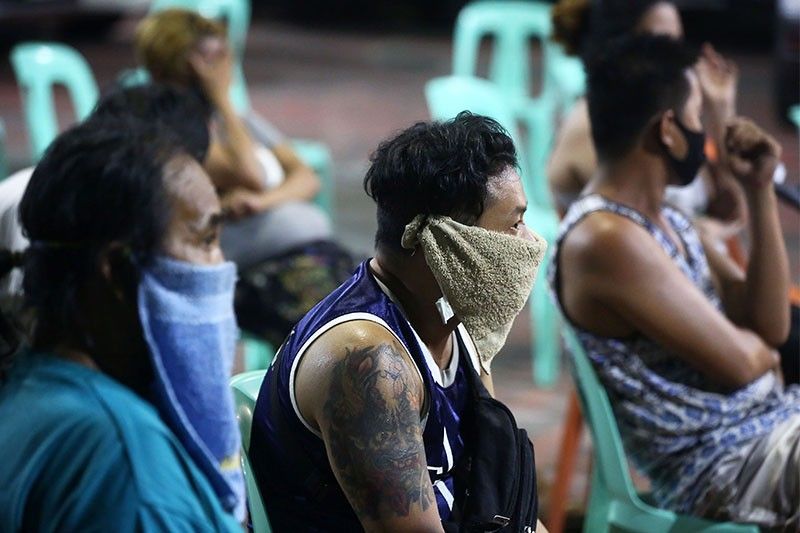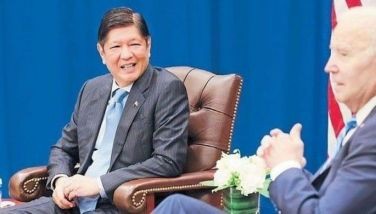On rising hunger, Palace says jobs can resume despite transport shortage

MANILA, Philippines — Malacañang on Monday said it was saddened by a recent national poll which found that 7.6 million Filipinos went hungry at least once in the last 3 months but held firm that employment opportunities are available to the public amid the pandemic.
"This news is saddening and its why we reopened the economy, in order to lower these numbers, especially of those who are hungry," presidential spokesman Harry Roque said in Filipino during a virtual briefing.
The survey, conducted by the Social Weather Stations from September 17 to 20, showed that 30.7% of FIlipinos experienced hunger due to lack of food to eat amid the ongoing health crisis, higher than the 20.9% recorded in July. SWS said these figures were the highest recorded since the 23.8% logged in March 2012.
Roque further reasoned that Metro Manila, which generates 60% of the country's gross domestic product (GDP), has long been under a general community quarantine (GCQ) which allows only 50% of the economy to operate. Under a modified GCQ, only 75% of the economy would be allowed to open, he added.
"So we understand that this is the reason that carpenters, drivers, and conductors, [and] those whose transportations are still limited, they are the ones who experience hunger," he said in Filipino.
"Ang pakiusap natin, pwede naman pong magtrabaho habang nariyan ang COVID-19. (This is our request, you can still work amid the pandemic)," Roque added.
He also touted several measures taken by the government to cushion the effects of the pandemic such as the social amelioration program meant to assist poor families and the P4.5 trillion national budget for 2021 which Roque said would create more jobs and lower the incidence of hunger in the country.
'Looming hunger crisis'
However, lawmakers recently slammed the social welfare department for failing to spend funds efficiently, particularly P10 billion in balance from the P205-billion SAP targeted to assist poor families displaced by the health crisis.
Earlier Monday, Senate Minority Leader Franklin Drilon also called for increased budgets for the health and social welfare departments in 2021 to strengthen the country's response to the lingering pandemic.
In a separate statement, Drilon sounded the alarm over the increasing number of families who experienced hunger amid the COVID-19 crisis, citing the same SWS survey.
"I am alarmed by the worsening condition of poor Filipino families affected by the pandemic. They are hungry, most of them women and children. This validates our concerns over the lack of [aid] in the proposed P4.5-trillion national budget for 2021," he said.
"We expect the figure to rise in the absence of adequate financial aid to the poor," he added, referring to the record-high hunger incidence figures logged by SWS.
"How can the government stomach the non-inclusion of a special amelioration program for 2021?" he added, urging the government to address the problem before it turns into a "full-blown crisis."
Senators propose solutions
Senate President Pro Tempore Ralph Recto and senators Risa Hontiveros and Francis Pangilinan, in separate statements, also made similar appeals to government, highlighting various solutions to the problem at hand.
Recto urged that the P10 billion in cash aid unspent by DSWD be given out as a third round of cash aid to poor families this Christmas season, while Hontiveros urged that the budget cuts on DSWD's feeding program be returned.
"Government should devote all necessary attention and resources to stopping this problem [with hunger] before it gets worse. If we do not act, many Filipinos may get sick or starve before the COVID-19 vaccine arrives," Hontiveros said.
She also reiterated the need for a so-called back-to-work czar "to lead the return of millions of Filipinos back to work during this time of crisis."
Meanwhile, Pangilinan welcomed new guidelines from the procurement policy board for government to buy directly from Filipino farmers and fisherfolk, which he said will raise the income of local food producers as well as address hunger by these vulnerable sectors.
"Buying local and buying direct from farmers will result in greater access to lower food prices for the consumers, and at the same time higher incomes for the Filipino agricultural workers, who remain among the poorest sectors in the country," he said.
Drilon, meanwhile, urged that the government tap into its P9 biliion in confidential and intelligence funds, the P16.5 billion anti-insurgency fund and the P468 billion supposed lump sum appropriations in the proposed 2021 budget to fund DSWD's cash aid program next year.
- Latest
- Trending



































